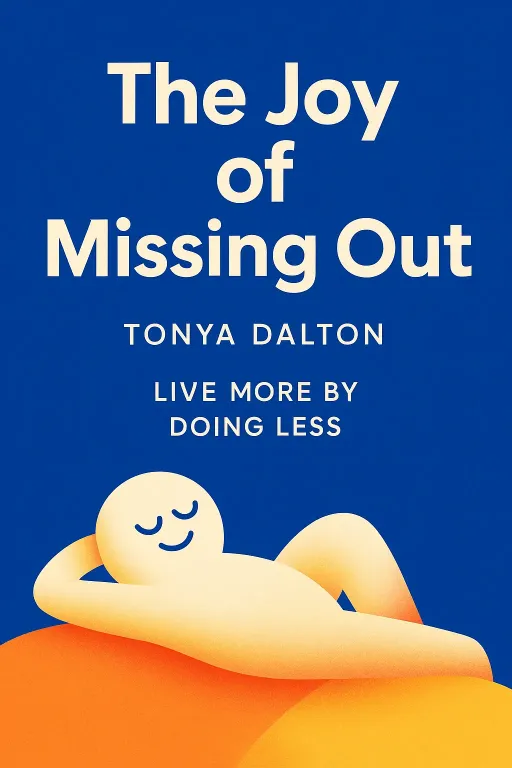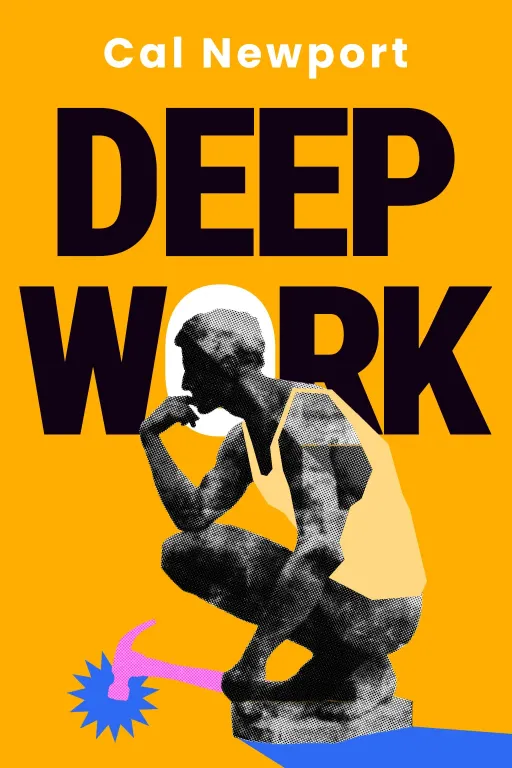
The Joy of Missing Out
10 minLive More by Doing Less
Introduction
Narrator: A woman stands in her kitchen on a beautiful spring morning, but she doesn't see the sun. She sees a mountain—a towering, impossible mountain of tasks on her to-do list. After a rushed and impatient morning dropping her daughter at preschool, she returns home only to be paralyzed by the sheer volume of what needs to be done. The feeling is so overwhelming that she simply breaks down, crying amidst the quiet of her own home. This raw, vulnerable moment is not just a personal story; it’s a universal experience in a world that glorifies being busy. It’s the central conflict that author Tonya Dalton confronts in her book, The Joy of Missing Out. Dalton argues that this feeling of overwhelm isn't about having too much to do; it's about not knowing where to start. Her book offers a pathway out, a method for trading the chaos of busyness for the profound satisfaction of a life lived with intention.
Redefining Productivity: From Pinball to Road Map
Key Insight 1
Narrator: The modern definition of productivity is broken. Society often equates busyness with worth, celebrating packed schedules and endless to-do lists as badges of honor. However, Dalton argues this is a dangerous illusion. True productivity is not about doing more; it's about doing what is most important. To illustrate this, she shares an analogy from a member of her online community named Emily, who perfectly captured the feeling of being busy versus being productive.
Emily described busyness as being like a marble in a pinball machine. You are constantly in motion, knocked from one bumper to another by urgent emails, unexpected demands, and ringing phones. There's a lot of noise and flashing lights, but there is no direction, no control, and no clear destination. You end the day exhausted but with a nagging feeling that nothing meaningful was actually accomplished.
Productivity, in contrast, is like following a road map. It requires knowing your destination—your point B—and intentionally charting a course to get there. It’s a deliberate, focused journey. This shift from pinball to road map requires a fundamental change in mindset. It means rejecting the cultural pressure to do everything and instead developing the clarity to focus only on the things that align with your core values and goals. This is the essence of the Joy of Missing Out, or JOMO: the intentional choice to let go of the clutter and noise to make space for what truly matters.
The Foundation of Discovery: Finding Your North Star
Key Insight 2
Narrator: Before one can create a road map, they must know their destination. Dalton’s framework, the liveWELL Method, begins with a crucial first step: Discovery. This is the process of defining one's personal "North Star," which consists of a mission, vision, and core values. This North Star acts as a compass, guiding every subsequent decision and ensuring that one's actions are aligned with their deepest purpose.
To show the profound importance of defining one's legacy, Dalton tells the historical story of Alfred Nobel. In 1888, Nobel, the inventor of dynamite, picked up a French newspaper to find a shocking headline: "The Merchant of Death Is Dead." The paper had mistakenly published his obituary instead of his brother's. As he read the scathing article, which condemned him for creating a tool of destruction, Nobel was horrified. This was not the legacy he wanted. The man who believed his invention would benefit humanity was instead going to be remembered as a purveyor of violence.
This accidental glimpse into his own legacy became a turning point. It forced Nobel to confront the gap between his intentions and his public perception. This profound moment of clarity led him to rewrite his will, dedicating his vast fortune to establishing the Nobel Prizes, which would celebrate individuals who made the greatest contributions to humanity. He used this jarring discovery to redefine his North Star and, in doing so, completely transformed his legacy. This story powerfully illustrates that understanding who you are and what you stand for is the non-negotiable foundation for building a productive and meaningful life.
The Myth of the To-Do List: Prioritizing Energy Over Tasks
Key Insight 3
Narrator: For many, the to-do list is a sacred tool, a security blanket in the face of chaos. Yet, Dalton argues that the traditional to-do list is one of the biggest barriers to true productivity. The problem is that it treats all tasks as equal. A long list gives the illusion of control, and crossing off items provides a satisfying hit of dopamine, but it doesn't distinguish between the urgent and the important. We often fill our days with easy, low-impact tasks just to feel a sense of accomplishment, while the truly significant work gets pushed aside.
Dalton suggests ditching the to-do list in favor of a "priority list." This requires moving through the second and third stages of her method: Clarity and Simplicity. Clarity is about using your North Star to filter what deserves your time and energy. Simplicity is about creating systems and routines that make it easier to execute on those priorities. Instead of a sprawling list, she advocates for identifying the few critical tasks that align with your goals, using frameworks like the Pareto Principle, which states that 80% of results often come from just 20% of the effort.
Letting go of the to-do list can feel terrifying, like the Peanuts character Linus having his security blanket taken away. It leaves one feeling exposed. But this discomfort is necessary for growth. By focusing on a handful of priorities and building simple, repeatable routines around them, you reduce decision fatigue and automate your most important work, freeing up mental and emotional energy for what really counts.
The Pursuit of Harmony, Not Balance
Key Insight 4
Narrator: The concept of "work-life balance" is another myth Dalton seeks to dismantle. The word "balance" implies a perfect, static equilibrium—a 50/50 split that is both unrealistic and undesirable. Life is not static; it is dynamic and ever-changing. The final step of the liveWELL Method, Harmony, proposes a more fluid and realistic goal. Harmony is not about giving equal attention to everything all the time, but about understanding that different areas of life will require more focus at different times, and that’s okay.
Dalton illustrates this with a story from a five-day rafting trip on the Arkansas River. On the final day, the group approached a notoriously difficult rapid. The guide, calm and confident, pulled the rafts ashore to scout the path ahead. He explained that even though he had run this river hundreds of times, the rapid was different every single day. The water level, the current, and the position of hidden rocks were constantly shifting. To navigate it safely, they couldn't rely on a fixed plan; they had to read the river in that moment and adapt their strategy.
Life is like that river. Trying to maintain a perfect, rigid balance is like trying to paddle against a powerful current. Harmony, however, is like being a skilled guide. It’s about understanding the changing flows of your life, knowing when to paddle hard in your career, when to pull ashore for family, and when to rest in a calm eddy. It’s an active, intentional process of adjusting and integrating the different parts of your life into a cohesive, fulfilling whole.
The Power of Choice: Owning Your Past to Build Your Future
Key Insight 5
Narrator: Ultimately, the journey to a productive, harmonious life comes down to a single, powerful concept: choice. In the book's conclusion, Dalton shares a deeply personal story to demonstrate that even in the face of significant trauma, the choice to define your own narrative is the most powerful tool you have. She recounts a terrifying break-in attempt during college and another distressing incident years later, both of which left her with deep-seated fears and shame. For a long time, these experiences defined her, making her feel like a victim.
Her turning point came when she made a conscious choice to stop being a victim and start being a survivor. She decided to use her past not as an anchor, but as fuel. She realized she had a choice: "We can take our experiences and allow them to swallow us whole, or we can use them as fuel to drive us." This mindset shift empowered her to take control, to build a life not in spite of her scars, but strengthened by them. This final insight ties the entire framework together. Productivity isn't just about systems and planners; it's about the fundamental belief in your own agency to create the life you want, regardless of your starting point.
Conclusion
Narrator: The single most important takeaway from The Joy of Missing Out is that productivity is not a skill to be learned, but an identity to be built. It begins not with managing your calendar, but with discovering yourself. The endless search for the perfect app, planner, or time-management hack is a distraction from the real work, which is the deeply personal journey of defining what matters to you and courageously aligning your life around that truth.
The book's most challenging idea is that the path to doing more often requires doing less. It asks us to question the very definition of a successful life, trading the external validation of "busy" for the internal peace of "purpose." The ultimate challenge, then, is not simply to learn how to say "no," but to first discover the profound, unshakable "yes" that makes all the necessary "no's" not a sacrifice, but a joy.









